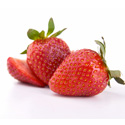Did you know that July is National Blueberry Month? It's true! This superfruit is one that people everywhere should take notice to. New research has shown that it might even help to reduce the risk of Alzheimer's! When we heard that, we were inspired to share with you:
3 #superfoods U need 2 incorporate into UR summer diet today…4 a #healthy, Alzheimer’s-free tomorrow! http://ctt.ec/1ocaP
 1. Blueberries
Researchers from the National Institute at Tufts University in Boston treated rats to bring on the affects of Alzheimer’s disease, and then fed a group of them a diet supplemented with blueberry extract for eight weeks. Compared to those rats fed a normal diet, the rats that ate blueberries lost fewer brain cells and were able to find their way around a maze more easily. You may not be a rat, but you can learn from one! Blueberries are sweetest in July. Let’s eat!
1. Blueberries
Researchers from the National Institute at Tufts University in Boston treated rats to bring on the affects of Alzheimer’s disease, and then fed a group of them a diet supplemented with blueberry extract for eight weeks. Compared to those rats fed a normal diet, the rats that ate blueberries lost fewer brain cells and were able to find their way around a maze more easily. You may not be a rat, but you can learn from one! Blueberries are sweetest in July. Let’s eat!
 2. Dark Leafy Greens
Deficiency of certain B vitamins, particularly folate, can make it difficult to perform some cognitive tasks. New evidence shows that even slightly low levels can have a similar effect because folate, along with vitamins B6 and B12, helps to keep homocysteine levels in check, an amino acid that impairs brain function and can increase a person's risk of Alzheimer's disease. Find folate in such healthy foods as kale, collards, swiss chard, and spinach.
2. Dark Leafy Greens
Deficiency of certain B vitamins, particularly folate, can make it difficult to perform some cognitive tasks. New evidence shows that even slightly low levels can have a similar effect because folate, along with vitamins B6 and B12, helps to keep homocysteine levels in check, an amino acid that impairs brain function and can increase a person's risk of Alzheimer's disease. Find folate in such healthy foods as kale, collards, swiss chard, and spinach.
 3. Strawberries
Strawberries are in season! Slice them! Toss them in a salad! Dust them with sugar! Whatever you do, eat them! In a study conducted by researchers at the Rush Institute for Healthy Aging, people who consumed the most vitamin E from foods like strawberries had a risk of Alzheimer's that was a whopping 67 percent lower than that of people who consumed the least. Pick up a bushel today!
3. Strawberries
Strawberries are in season! Slice them! Toss them in a salad! Dust them with sugar! Whatever you do, eat them! In a study conducted by researchers at the Rush Institute for Healthy Aging, people who consumed the most vitamin E from foods like strawberries had a risk of Alzheimer's that was a whopping 67 percent lower than that of people who consumed the least. Pick up a bushel today!

No comments:
Post a Comment